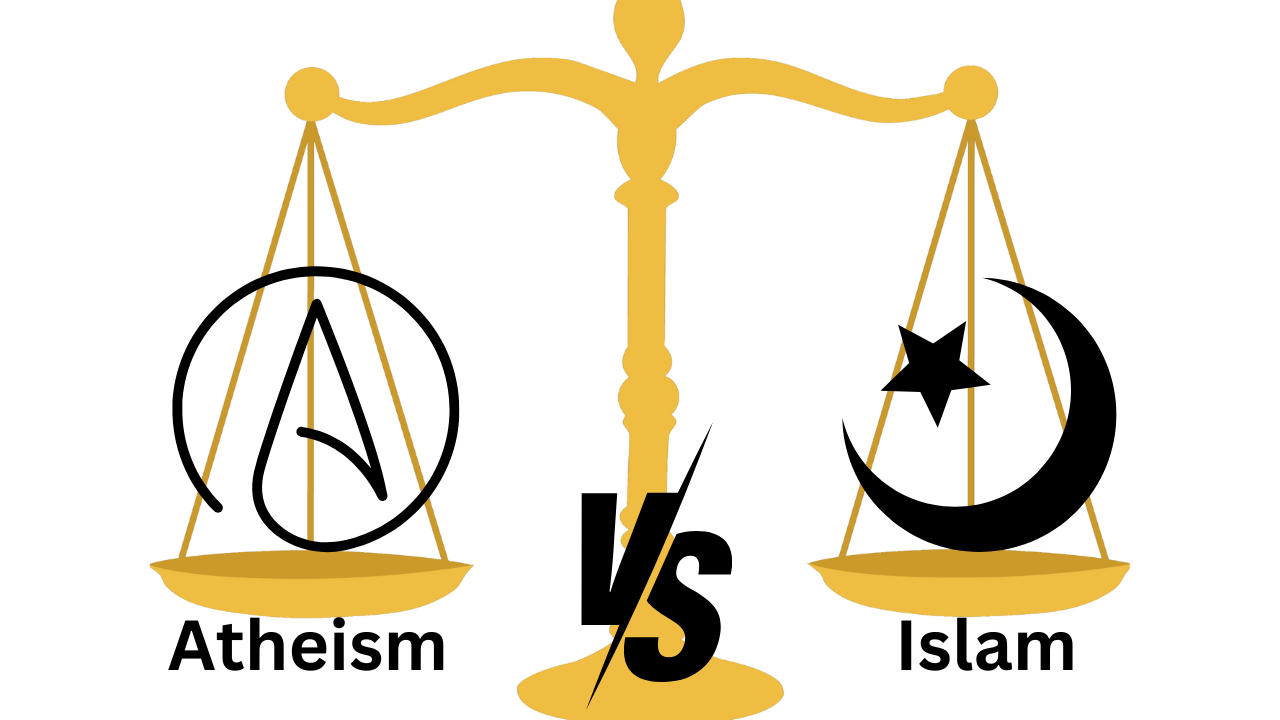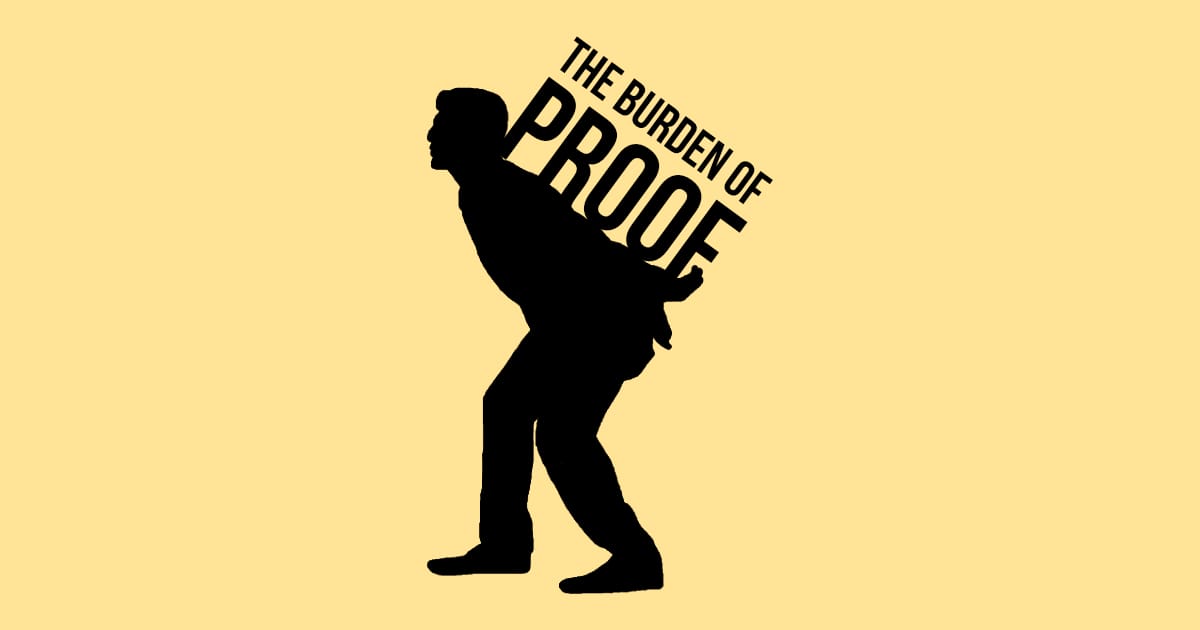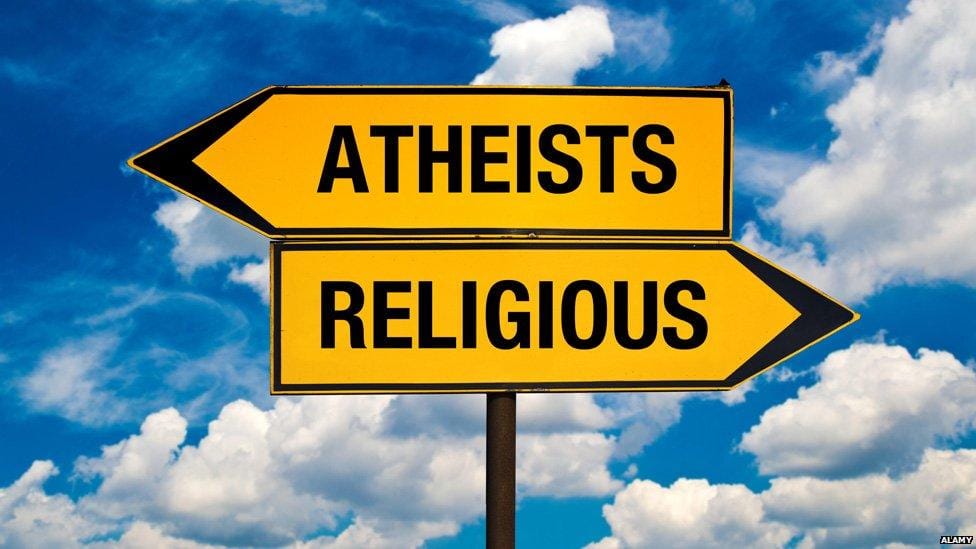Do Atheists have to prove anything? Discussing the burden of proof.

On YouTube there is a famous video by Richard Dawkins titled “What are the five best reasons why there is no god.” The first reason Dawkins cites is that “the onus is not upon the atheist to say why there is not something the onus is on the theist to say why there is.” Dawkins is basically saying that he does not even need to make an argument for why God does not exist because the burden of proof is not on him, the atheist, but on the theist.
In this article we will see why this line of argumentation is wrong. The burden of proof is not only on the theist but also on the atheist. While this may seem obvious to many, many online atheists, and even academics like Dawkins, will still claim otherwise and thus this is an important matter to discuss.
What is the burden of proof?

The burden of proof is essentially the job of a person who is making a claim within a discussion to show proof for their claim. For instance, if two people were together discussing the date of the midterm exam, and person A says that the midterm is tomorrow while person B says the midterm is next week, then both person A and person B are claiming something and thus the burden of proof falls on both of them.
When is a ‘claim’ made? Or what is a ‘claim.’ A claim is any statement or belief put forth by someone that asserts something. So person A asserted (claimed) that the midterm exam is tomorrow. While person B asserted (claimed) that the midterm exam is next week.
Now why are we going in depth with these matters? Well, the reasons why is because on this matter of burden of proof, many atheists will claim that only positive claims require proof while negative claims do not.
A positive claim is asserting that something is or that something exists. A negative claim on the other hand asserts that something is not or does not exist. For example, a positive claim is saying that the test is tomorrow. A negative claim is asserting that the test will NOT be tomorrow.
Now there comes an issue of dispute: does someone making a negative claim have the burden of proof? Well, imagine someone saying the test is tomorrow while another says the test is not tomorrow. You also being a student in the same class as them, and you knowing that there is an upcoming exam but you forgot what day it would be, would you only ask the student making the positive claim (saying the test is tomorrow) for proof? And would you just ignore the person making the negative claim (saying the test is not tomorrow) and not even ask him? What if the person claiming the test is tomorrow provides evidence of this claim, but the other person still insists that the test is not tomorrow.
Does this make sense? Not really. Rightfully so everyone would tell the person making the negative claim what evidence do they have that the test is not tomorrow. I mean, this can make the difference between pulling an all nighter and sleeping comfortably for some people. If we take a look at this case, it is clear that we would demand proof for both the individual making the positive claim and the individual making the negative claim.
Now that we understood what the burden of proof is, and that both positive and negative claims require proof, let us now discuss atheism, atheists, and whether they have the burden of proof.
Atheists

Prior to discuss what atheism is, let us first understand what theism is. Atheism is the opposite of theism so understanding theism can help us understand atheism. Theism is the belief that at least one God exists. The belief of theism can look something like this:
T believe in G
In a discussion, theists are making the positive claim. They are claim that there is a God and thus they do have, to a certain extent, some form of the burden of proof.
Now what does atheism mean? Well, if theism is the positive claim on the existence of God, then atheism is the NEGATIVE claim when it comes to the existence of God. Atheists believe and make the claim that God does NOT exist.
A believes in Not G.
Seems pretty simple right? If theists are making the positive claim, and atheists are making the negative claim, then both atheists and theists have the burden of proof put on them in a given discussion on the existence of God.
Well I wish things were that simple. The problem that arises is that many atheists will argue against this. Many online atheists will claim that the burden of proof does not fall on them. They will argue this in two ways: first, by shifting the definition of atheism from the non-belief in God to the lack of belief in God. Due to them simply lacking the belief in a God, they are not really making any claim. The second way they will argue this is by stating that atheism is the original position. Meaning that people are not born believing in God. This idea of God is given to us by society and we are actually born atheists. Thus, if atheism is the original belief position, then once again the burden of proof falls squarely on the theist and not the atheist.
Debunking the controversy.
Let us start of by debunking the claim that atheism is simply lack belief in a God. This definition of lack belief is not something held by really any academic philosopher. If one were to go to academia and ask atheist philosophers what atheism means, most likely than not you wont find one that says it means ‘lack’ belief.
Well rather than making you go and ask some atheist philosophers what atheism means, I compiled a list of some well-known and respected atheist philosophers who define atheism as not lack belief but non-belief. Atheism is defined as follows by these philosophers "Philosopher William Rowe states, “To be an atheist in the broad sense is to deny the existence of any sort of divine being.” Similarly, Graham Oppy writes, “Atheism says that there are no gods.” Paul Draper states that atheism is “best understood in philosophy as the metaphysical claim that God does not exist.” And J. L. Schellenberg defends a similar definition of atheism “understood as disbelief of traditional theism.”
Now some online atheists may be quick to go “authority fallacy! Just because this philosopher says atheism is defined in this way does not mean that is the only way to define it!” However, I did not cite these atheist philosophers for the purpose of of saying because they say X, X is right. The reason why I showed the opinions of these atheists philosophers is to show that amongst academics, especially philosophers, academics do not uphold lack theism idea. If one were to take a class in philosophy and the teacher told them to argue whether God exists or not, and they (the atheists) simply say on the paper that the burden of proof is not on them because they simply lack belief, well they won’t be getting the top mark in the class with that line of argumentation.
Secondly, even if we were to grant the online atheist this ‘lack’ belief, lacking belief in something still means one is making a claim. They are simply claiming that they do not belief in X (in this case, God). Because if one is saying they lack the belief in X, it means the opposite of X (not X) they do believe in. Going back to the exam scenario mentioned previously, if someone said “I simply lack the belief that there is an exam tomorrow,” in a discussion, that claim STILL needs a defense. Why? Because this individual is not saying “I lack the belief in both the exam being tomorrow and not being tomorrow” they are only negating one of the belief claims (that the exam is tomorrow). Therefore, they are saying that the exam is in another day.
Philosopher and atheist Graham Oppy discusses this notion of ‘lack theists.’ He asks those atheists who say that they are lack theists, “what's your attitude to the proposition that there are no God? What's you attitude to that one? If you don't have an answer to that question, then you just don't have a well though out position at this point. The people who call themselves lack theists have to give themselves an answer to that question." So EVEN the claim “I lack belief in the belief of a God” still needs proof for why they lack that belief. This could be due to a variety of reasons: the belief in God is widespread, there are many religions, most people in the world believe in at least one God, etc.
Now let us move on to the second point that atheism is the original belief; or, that we are born atheists. Well, if an atheists were to say this, then would this not be a claim? Are not the atheist claiming that atheism is the original belief? Are they not making the claim that we are born atheism? So if they are making this claim, then the burden of proof is on them to prove atheism is the original state of man and that we are born atheists. Making this assertion just means that they have even MORE burden of proof on their shoulders. Not only do they have the burden of proof of why they lack belief in God, but they have to prove that we are born atheists and that atheism is the original belief.
Furthermore, atheism being the original belief seems like a stretch. For starters, in any other given discussion or debate is the rejection or lack belief in something the original position? For instance, is the original position of knowing whether we landed on the moon rejection of the fact that we landed on the moon? Or, and this is my point, is the original position agnosticism? I mean, if someone asks someone if we landed on the moon, or if Messi is a better Football (soccer) player than Ronaldo, wouldn't the original position for someone who has never watched a game of football be simply “I don’t know?”
The online atheist wants to make us believe that the original position when it comes to God is rejection of lack belief in the existence of God; but, in no other field of study or area is rejection the original belief. Agnosticism is the original belief.
Now even though agnosticism is the original position people take, that does not mean that agnostics (or atheists who suddenly want to become agnostics to not deal with the burden of proof) do not have the burden of proof. Even agnostics have the burden of proof to some extent.
For instance, if you met someone that on every issue and in every debate and every discussion they literally just say “I am not convinced,” would you not, at one point, ask them “well what would convince you?” This is the burden of proof for agnostics. Agnostics have to provide at least some reason why they are not convinced either by atheism or theism. Atheism and theism are not topics that only a few people in the world have heard about; a majority of people in the world either believe in a God, multiple Gods, or no God. For someone to be agnostic on this matter simply means they truly might not care about whether God exists or not. If that is the case, then their presence in a debate or discussion on whether God exists or not is worthless.
To conclude this section, atheists, theists, and agnostics do have some form of the burden of proof. If they want to convince someone else, debate someone else, or engage in any form of discussion with someone else on this matter, then they (agnostic, theist, atheist) has the burden of proof on them.
Conclusion
The purpose of this article was to shift the discourse surrounding atheism and theism. Many times some online atheists try to find tricks and ways of dealing with theists. Rather than openly discussing with theists, some online atheists will try to do things like shifting the burden of proof away from them and to the theist. As we can see, this shifting of the burden of proof simply does not work as both atheists and even agnostics have some element of the burden of proof.
